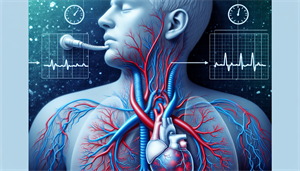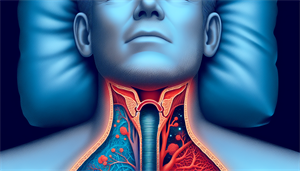Imagine if a good night’s sleep could be the key to a healthy heart. Sounds simple, right? Yet sleep disorders like sleep apnea often go unnoticed and untreated, leading to significant heart health problems. But how does this occur? Can sleep apnea cause heart problems? And what can be done about it? If you’ve ever pondered these questions – or even if you haven’t – buckle up. We’re about to dive deep into the world of sleep and heart health, and reveal how they are more intricately connected than you might think.
Key Takeaways
-
Sleep apnea, characterized by pauses in breathing during sleep, leads to decreased oxygen levels in the blood and an increased cardiac workload, which can contribute to the development of heart diseases such as hypertension, heart failure, and coronary heart disease.
-
Effective treatment of sleep apnea, specifically through CPAP therapy and lifestyle changes, can mitigate these risks by maintaining open airways, stable oxygen levels, and alleviating strain on the cardiovascular system during sleep.
-
Timely and accurate diagnosis of sleep apnea through sleep studies is critical for its management, which involves both sleep specialists and cardiologists working collaboratively to diagnose sleep disorders and related cardiac issues for enhanced patient outcomes.
Unveiling the Connection: Sleep Apnea and Heart Health

Have you ever wondered why we need to sleep? It’s not just about resting our bodies or our minds. Sleep serves as a vital biological function, facilitating:
-
cell repair
-
memory consolidation
-
hormone regulation
-
immune system function
But what happens when sleep is interrupted or fragmented because of a condition like sleep apnea? The effects can be serious, especially on our cardiovascular system.
Characterized by pauses in breathing during slumber, sleep apnea is a prevalent sleep disorder. These brief pauses in breathing can occur many times throughout the night. If left untreated, sleep apnea can lead to regular sleep disruptions, the release of stress hormones, and an increased risk of heart disease and other cardiovascular problems. There are three types of sleep apnea - obstructive sleep apnea, central sleep apnea, and complex sleep apnea. Regardless of the type, sleep apnea leads to decreased oxygen levels in the blood, leading to increased cardiac workload as the heart strives to pump oxygenated blood throughout the body.
However, it’s not all negative. The treatment of sleep apnea has the potential to bring about substantial enhancements to one’s overall health, which may include:
-
a reduction in the severity of heart disease
-
improved blood pressure control
-
decreased risk of stroke
-
better cognitive function
-
increased energy levels
The Impact of Interrupted Sleep on the Cardiovascular System
Interrupted sleep, often resulting from sleep apnea, can heavily impact our cardiovascular system. When we’re asleep, our bodies are supposed to be at rest. But when sleep is interrupted, it can trigger mechanisms that impose stress on the cardiovascular system.
These interruptions in sleep can lead to:
-
Decreased blood oxygen levels, potentially causing harm to blood vessels and the heart
-
Activation of molecules that initiate inflammation and contribute to arterial fatty deposits
-
Fragmented sleep due to obstructive sleep apnea (OSA), which can result in interrupted breathing and is linked to various cardiovascular issues.
How Severe Sleep Apnea Increases Cardiac Risk

The severity of sleep apnea significantly influences its impact. Severe sleep apnea not only disrupts sleep but also poses a significant risk to our heart health. Approximately 30% of individuals with hypertension also have obstructive sleep apnea, and the likelihood of developing hypertension increases to 50% for those with obstructive sleep apnea.
But the risks don’t stop at hypertension. Sleep apnea is associated with a 140% increased risk of heart failure and a 30% increased risk of coronary heart disease. These findings highlight the importance of addressing sleep apnea as a potential risk factor for heart-related conditions. Severe sleep apnea may result in significant cardiac issues, including high blood pressure, irregular heartbeat, and an elevated susceptibility to coronary artery disease.
The Physiology Behind Sleep Apnea and Heart Disease

A grasp of the physiology underlying sleep apnea aids in understanding its considerable threat to cardiac health. Sleep apnea affects the heart primarily through two key mechanisms: oxygen deprivation and blood pressure fluctuations during sleep.
Repetitive alterations in blood pressure, a common occurrence in sleep apnea, have the potential to induce hypertension or exacerbate pre-existing hypertension. Furthermore, the lack of sufficient sleep due to sleep apnea can lead to heightened susceptibility to hypertension, heart disease, heart attacks, and stroke, significantly impacting the health of the heart and cardiovascular system.
Oxygen Deprivation and the Heart
Frequent in sleep apnea, oxygen deprivation can gravely affect cardiac health. When we breathe normally, our bodies receive a constant supply of oxygen that our cells need for energy. However, in sleep apnea, recurrent pauses in respiration lead to intermittent hypoxia and hypercapnia, resulting in oxygen deprivation.
The potential cardiovascular implications of oxygen deprivation linked to sleep apnea include:
-
Hypertension
-
Ischemic heart disease
-
Heart failure
-
Stroke
Oxygen deprivation resulting from sleep apnea can induce heart stress and arrhythmias. The occurrence of cardiac arrhythmias can be attributed to sleep apnea, which is linked to heightened epicardial adipose tissue, potentially resulting from hypoxia-induced inflammatory restructuring of adipose deposits, which in turn can impact the heart’s rhythm.
Blood Pressure Fluctuations During Sleep
Blood pressure fluctuations during sleep, another consequence of sleep apnea, can also have a damaging effect on the heart. Repetitive episodes of sleep apnea-induced hypoxemia and hypercapnia lead to reflex changes in both sympathetic and parasympathetic activation, resulting in blood pressure fluctuations during sleep apnea episodes.
The impact of sleep apnea-induced hypertension on the heart involves promoting nocturnal hypertension and potentially leading to the development of sustained daytime hypertension. This is attributed to mechanisms such as sympathetic activation, activation of the renin-angiotensin-aldosterone system, and inflammation, which are responses to repetitive sleep apnea-induced hypoxemia and hypercapnia. Nocturnal blood pressure spikes are becoming more acknowledged as an indicator of cardiovascular risk, encompassing heart disease and stroke.
Elevated blood pressure during sleep is strongly linked to future cardiovascular incidents and organ impairment. Blood pressure fluctuations during sleep have a negative impact on the cardiovascular system, increasing the risk of cardiovascular disease, including heart disease.
Recognizing the Symptoms: When Sleep Apnea Affects Your Heart

While the physical consequences of sleep apnea are significant, it’s just as vital to identify symptoms that could affect heart health. The symptoms of sleep apnea that affect the heart include excessive daytime sleepiness, loud snoring, and gasping for air during sleep.
Excessive daytime sleepiness is a commonly observed symptom in individuals with sleep apnea and has been correlated with a heightened susceptibility to cardiovascular diseases. Gasping for air during sleep may indicate the presence of sleep apnea, a condition characterized by sudden drops in blood oxygen levels that can have negative effects on heart health.
Excessive Daytime Sleepiness and Cardiovascular Warning Signs
Daytime sleepiness, often seen in sleep apnea patients, could serve as an indicator of potential cardiovascular problems. Excessive daytime sleepiness is frequently cited as a prevalent symptom among individuals diagnosed with obstructive sleep apnea (OSA).
Sleep apnea-related heart problems can present as excessive daytime sleepiness, fatigue, and drowsiness. Cardiovascular indicators of sleep apnea that should be taken seriously include issues with the rhythm of the heart such as atrial fibrillation and bradycardia. Additionally, sleep apnea raises the likelihood of heart failure and coronary heart disease.
If left untreated, sleep apnea can result in obstructed arteries and diminished heart muscle function, thereby elevating the risk of heart-related conditions such as heart attacks.
Loud Snoring, Gasping, and the Red Flags for Heart Concerns

Loud snoring and gasping during sleep, while seemingly trivial nuisances, can actually signal grave heart issues. Loud snoring and gasping during sleep may indicate underlying heart concerns related to sleep apnea.
The presence of loud snoring and sleep apnea has been connected to increased occurrences of hypertension, stroke, and coronary artery disease. Sleep apnea-induced snoring and gasping episodes can be identified through a variety of symptoms, such as loud snoring, witnessed apneas or gasping/choking episodes during sleep, and excessive daytime sleepiness.
The prevalence of sleep-disordered breathing among patients with symptomatic heart failure is 40% to 60%, with obstructive sleep apnea (OSA) making up approximately one-third of cases.
Treatment Pathways: Addressing Sleep Apnea to Protect Your Heart

So, what measures can we take to shield our hearts from the impacts of sleep apnea? There are several treatment pathways available, including CPAP therapy and lifestyle modifications. The most effective and commonly used treatment for sleep apnea is CPAP therapy.
CPAP therapy is designed to use pressurized air to maintain an individual’s airway open during sleep, thus ensuring uninterrupted breathing. CPAP treatment alleviates strain on the heart and the cardiovascular system by maintaining uninterrupted breathing and stable oxygen levels during sleep.
Apart from CPAP therapy, lifestyle modifications can also aid in the treatment of sleep apnea and in safeguarding the heart.
CPAP Therapy: Breathing Easier for Heart Health
There’s a compelling reason why CPAP therapy remains the primary treatment option for sleep apnea. CPAP therapy is designed to facilitate easier breathing for patients during sleep by utilizing a machine to administer pressurized air through a mask. This approach helps to keep the airway open and alleviate strain on the heart, thereby enhancing cardiovascular well-being.
Consistent CPAP use has been linked to significant cardiovascular benefits, such as reducing the risk of second heart attack or stroke by maintaining open airways and decreasing nocturnal blood pressure spikes. Despite its benefits, CPAP therapy can have possible adverse effects on cardiovascular function, including brady and tachyarrhythmias, sudden cardiac death, and alterations in intrathoracic pressure, preload, afterload, cardiac output, and left ventricular ejection fraction, which are typically infrequent but necessitate close monitoring.
Lifestyle Modifications for a Good Night's Sleep and a Healthy Heart
Adopting lifestyle changes can significantly contribute to managing sleep apnea and fostering heart health. Weight management and regular physical activity can enhance sleep quality and mitigate the risk of heart issues associated with sleep apnea.
Maintaining a healthy weight plays a crucial role in addressing both sleep apnea and heart health. Sleep apnea is more prevalent in individuals who are overweight or obese, and there is also an increased risk of cardiovascular disease among people with sleep apnea.
Dietary-induced weight loss and exercise are viable lifestyle treatments for sleep apnea. Prioritizing a heart-healthy diet, incorporating:
-
vegetables
-
fruits
-
legumes
-
lean meats
-
fish
-
low-fat or fat-free dairy products
is also crucial.
Mouth and throat exercises, also referred to as oropharyngeal muscle exercises, have been shown to be beneficial in improving obstructive sleep apnea and decreasing snoring.
Diagnostic Journey: From Sleep Study to Sleep Apnea Diagnosis

The journey towards managing sleep apnea and safeguarding heart health commences with an accurate diagnosis. Diagnostic procedures for sleep apnea commonly entail a thorough sleep assessment and polysomnography to confirm or eliminate the presence of this significant condition.
Polysomnography, also referred to as a sleep study, is a non-invasive examination that records various physiological parameters associated with sleep and wakefulness. It is widely recognized as the gold standard for diagnosing sleep apnea, assessing its severity, and examining other sleep disorders.
Timely diagnosis plays a critical role in the management and treatment of sleep apnea, thereby influencing overall health and well-being, particularly heart health.
What Happens During a Sleep Study?
Polysomnography, or a sleep study, is a diagnostic instrument employed for the detection of sleep disorders like sleep apnea. The technology includes:
-
Recording of brain waves
-
Monitoring of oxygen levels in the blood
-
Monitoring of heart rate
-
Monitoring of other physiological functions during sleep.
During a sleep study, a range of physiological functions including brain waves, blood oxygen levels, heart rate, and breathing patterns are carefully monitored and recorded to detect any irregular activities that may occur during sleep. Sleep studies identify interruptions in breathing by utilizing sensors to monitor breathing patterns through the nose or mouth, movements of the chest and abdomen, and observing the related muscle activity. Additionally, they track oxygen levels and fluctuations in heart rate.
Next Steps After Diagnosis
Following a confirmed sleep apnea diagnosis, the subsequent steps entail appropriate treatment and ongoing care to manage the disorder and guard heart health. Treating sleep apnea can have a significant positive effect on heart health. Studies have shown that obstructive sleep apnea is associated with increased risks of high blood pressure, stroke, and heart failure. The most common treatment, continuous positive airway pressure (CPAP) therapy, can alleviate the strain on the heart by keeping the airway open during sleep.
After a diagnosis of sleep apnea, it is recommended to make several lifestyle adjustments to promote heart health. These include:
-
Weight loss
-
Increased physical activity
-
Cessation of smoking and alcohol consumption
-
Avoidance of certain medications
-
Modification of sleep patterns
-
Using an elevated head position during sleep
-
Maintaining a healthy diet with regular exercise.
Following a diagnosis of sleep apnea, it is crucial to regularly consult with a healthcare provider, usually on an annual basis, to assess the condition and the effectiveness of the CPAP equipment. If any issues arise with the treatment, semiannual check-ups may be required.
The Role of Medical Professionals in Managing Sleep Apnea and Heart Disease
Healthcare professionals hold a significant role in overseeing sleep apnea and heart disease. A collaborative care approach in managing sleep apnea and heart disease yields numerous advantages, such as:
-
Enhancing overall quality of life
-
Improving mood
-
Increasing work productivity
-
Achieving patient-centered outcomes.
Sleep specialists hold a pivotal role in the management of sleep apnea through the diagnosis and treatment of sleep disorders. Cardiologists have a significant impact on managing heart disease in patients with sleep apnea. They are responsible for diagnosing and treating conditions like hypertension, atrial fibrillation, coronary artery disease, and congestive heart failure that are linked to sleep apnea. Additionally, they identify sleep apnea in patients and suggest suitable treatment approaches, such as continuous positive airway pressure (CPAP) therapy, to enhance patient outcomes.
When to Consult a Sleep Clinic or Doctor for Loud Snoring
Identifying the right time to seek advice from a sleep clinic or physician for loud snoring is essential in controlling sleep apnea and preserving heart health. It is advisable to consult a sleep clinic or doctor if one experiences:
-
Loud snoring
-
Frequent pauses in breathing during sleep
-
Choking or gasping during sleep
-
Excessive daytime sleepiness
-
Morning headaches
-
Difficulty concentrating
-
Irritability or mood changes
-
High blood pressure
These symptoms may be affecting their heart health.
It is important to consult with your healthcare provider if you experience symptoms of sleep apnea or if you are dealing with sleep issues that result in fatigue, drowsiness, and irritability. Indeed, loud snoring can serve as a manifestation of obstructive sleep apnea, a condition that heightens the susceptibility to heart issues such as hypertension, stroke, and heart attack.
Collaborative Care: Working with Cardiologists and Sleep Specialists
Joint care involving cardiologists and sleep specialists can revolutionize the management of sleep apnea and mitigate heart problem risks. A collaborative care approach in the context of sleep apnea and heart health is a significant approach to treatment that involves close coordination between sleep specialists and cardiologists.
The role of a cardiologist in managing sleep apnea is significant, as it is linked to various heart conditions like hypertension, atrial fibrillation, and coronary artery disease. Cardiologists may conduct sleep studies to diagnose sleep apnea and evaluate the risk of heart failure. Furthermore, they may work closely with sleep specialists to devise treatment strategies, which could involve medications, CPAP therapy, or surgical intervention.
Sleep specialists play a crucial role in lowering the risk of heart diseases by diagnosing and treating sleep disorders such as:
-
Insomnia
-
Apnea
-
Narcolepsy
-
Restless legs syndrome
These sleep disorders have been linked to a higher risk of cardiovascular diseases.
Summary
To sum up, sleep apnea is more than just a sleep disorder disrupting our nights. It’s a significant health concern that can have a profound impact on our heart health. From causing oxygen deprivation and blood pressure fluctuations to elevating the risk of heart failure and coronary heart disease, untreated sleep apnea is a hidden enemy of the heart. Recognizing the symptoms, seeking timely diagnosis, and adhering to treatment pathways such as CPAP therapy or lifestyle modifications can go a long way in managing sleep apnea and safeguarding your heart. Ultimately, a good night’s sleep may be just what the doctor ordered for a healthy heart.
Frequently Asked Questions
What can happen if you don't treat sleep apnea?
Untreated sleep apnea can lead to heart damage, heart failure, and an increased risk of developing insulin resistance, type 2 diabetes, and metabolic syndrome, ultimately increasing the risk of heart disease.
When is sleep apnea considered severe?
Sleep apnea is considered severe when the Apnea-Hypopnea Index (AHI) is greater than 30, indicating more than 30 episodes per hour. This indicates a significant obstruction in breathing during sleep.
What is sleep apnea and how does it affect the heart?
Untreated sleep apnea can lead to sleep disruptions, stress hormone release, and an increased risk of heart disease and cardiovascular problems due to decreased oxygen levels and increased cardiac workload.
How is sleep apnea treated to protect heart health?
To protect heart health, the most effective treatment for sleep apnea is CPAP therapy, which uses pressurized air to keep the airway open during sleep. Lifestyle changes like weight management and regular physical activity can also support the treatment of sleep apnea and benefit heart health.
How is sleep apnea diagnosed?
Sleep apnea is usually diagnosed through a comprehensive sleep assessment and polysomnography, also known as a sleep study, to determine the presence of this condition. This is the most common method for diagnosing sleep apnea.


